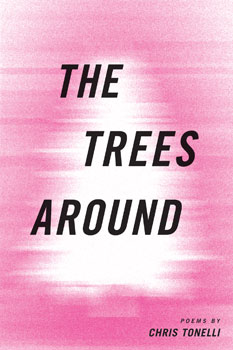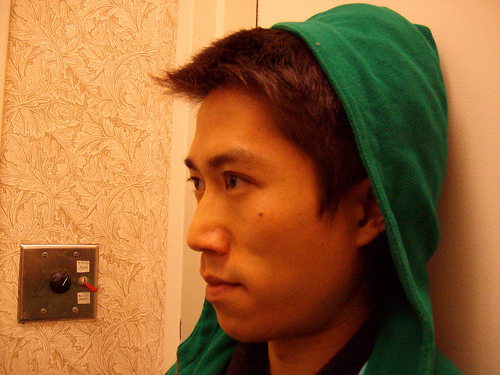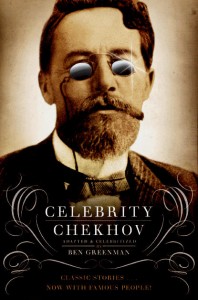{LMC} On Ken Sparling’s “What Can the World Do For Elrond?”
Ed: You can read a PDF of this story, here, so you can better participate. Buy NY Tyrant. If you would like to have the full PDF of NY Tyrant 8 so you can participate in this month’s LMC discussions, get in touch with me. But still, when you buy a literary magazine, an angel gets its wings.
“My life comes in bits, fragments, brief paragraphs, and sometimes a page or two, so it makes sense that this is my unit of storytelling.”
Sparling drops this quote in an interview conducted by Michael Kimball, published in The Faster Times (read the whole thing here), and it’s a wonderful distillation of his technique, even more appropriate in its very succinctness.
He goes on: “It isn’t so much that the storytelling units are small in my books, more that they don’t seem connected, they don’t seem to relate to each other. There seems to be no rules for what happens after a reader encounters an expanse of white space and moves onto the next little bit. Whatever it is that sustains each individual section seems to break down as soon as a section ends.”
{LMC}: A Letter to Padgett Powell, From the Famed Autodidact Lonny Nilsson
Ed: You can read a PDF of this interview, here, so you can better participate. Buy NY Tyrant.
Man, Powell, you are a redneck savant.
Powell, I’m writing to you about your interview with a Jacob, Jacob White. You know, you can say he’s a Jacob, because there’s a many Jacobs in the world, just as there are a many pitbulls that’ll kill your littler dogs, as you so say. But can we correctly say you’re a Padgett? I’m not so sure. I mean, you are a Padgett, don’t get me wrong, but to say so seems a mite disingenuous, as though I were to say you are a three-headed rattlesnake: You’re probably more the three-headed rattlesnake.
Powell, I called myself a famed autodidact in the title of this letter because you put a pressure on me, in your skills. You put a pressure on all of us. You’re a writer in the mold of writers who do things other than write—a practical mode, this is. In the shadow of your many voices, many minds and many habits, I call myself an autodidact, and I do try—but crafts seem to wither at my touch, you know, as though I’m a wrecking ball come to break things down rather than put them together, and I can’t hardly overcome my big iron-spherical nature. But hey.
Powell, we don’t send half-enough letters these days, and at the beginning of this compilation-of-many-sorts you are in, this New York Tyrant 8, sort of diverse in that way you are diverse, there’s a letter unsent from the great West Virginian Breece D’J Pancake to his mother, in which he dreams double-layered about a strange kind of deathless yet skeleton-haunted world. If a letter, even unsent, is good enough for Pancake, it’s better than me, and hopefully better for me, than to continue trying to fish and hunt and roof in your image and keep hooking my buddies, jamming my gun, falling through the ceiling like the paralyzed man on his pallet in Mark, sans rope and pulleys.
{LMC}: On Bradford Tice’s “How to Be an American Boy”
Ed: You can read a PDF of this story, here, so you can better participate. Buy NY Tyrant.
Even with broken parts, you can build a functional machine. Take a bent manifold, a rusty chain and suddenly you have a robot that walks only into walls, a radio playing only silence, furniture that won’t talk. Likewise, some writer’s can weld together adolescence’s great banalities, its cliches and tritenesses, into really satisfying fiction. Bradford Tice’s “How to Become An American Boy,” an awkwardly told coming-out tale of one queer youth in flyover U.S.A., is a perfect example.
From the title on, the story begs for derision. It is broken into eight segments, four goals (with titles like “Goal Three: Find a male role model” and “Goal Four: Be Stoic in the Face of Disaster”), each followed by a “Self-Actualization Scene.” To enhance the general PSA atmosphere, each of the Goal segments takes place primarily in a psychiatrist’s chair. There’s a shadowy expectation of hate crimes or sexual violence. Moreover, it’s written in the second person future. That “You” is the main character, and that this is the story of what “You” will do, could almost justify total dismissal of the work, but, happily, that reaction is precisely the gasoline on which this machine runs.
Noah Cicero on the “Anti-Intellectual”
Someone on my Facebook suggested that Internet Literary Writers are not intellectuals.
That they are actually anti-intellectual.
They stated that we speak nonsense.
That it isn’t helping the culture.
I went to the park and sat on a swing for two days wondering, “Am I anti-intellectual? What does it mean to be anti-intellectual? And if I am being anti-intellectual, how am I doing such a thing?”
Then I read some Sam Pink to see, I read this line, “I went to the cantaloupe section and looked at the cantaloupes.”
I stared at the line for a long time. I even counted the syllables. I counted 16 syllables. It has a little meter but not much. I could see the word cantaloupes repeated. Sam Pink is trying to imply the absurdity of cantaloupes to us. A strange round plant that is like a vegetable because it grows on the ground but is actually a fruit because the seeds are contained inside of it. Maybe he is putting out a metaphor here, a fruit that grows like a vegetable. Perhaps Sam Pink is saying he is confused about his identity like the cantaloupe is about his.
The strangest thing about the cantaloupe line is the etymology of the word “cantaloupe.” The word cantaloupe comes from the Latin word Cantalupe. Even if you know a little Spanish you can see quickly that canta lupe means “singing wolf.” Perhaps Sam Pink is trying to convey that he is like the Cantaloupe a “singing wolf.” But to go deeper a “lupe” was a prostitute in ancient Rome, so maybe Sam Pink is also saying that he is a prostitute to modern America’s corporate capitalism and even though he is suffocated by inverted-totalitarianism he will still sing his song.
And strangely it goes into Heidegger’s idea of Being. As soon as the character enters the grocery store, he knows his next move into the future. He knows his habits. He goes forward in a predictable mechanical fashion. But at the same time of being in the modern world of gadgets he needs the most primitive of things, food.
As Socrates said in Plato’s Apology,
When I left the politicians, I went to the poets; tragic, dithyrambic, and all sorts. And there, I said to myself, you will be detected; now you will find out that you are more ignorant than they are. Accordingly, I took them some of the most elaborate passages in their own writings, and asked what was the meaning of them – thinking that they would teach me something. Will you believe me? I am almost ashamed to speak of this, but still I must say that there is hardly a person present who would not have talked better about their poetry than they did themselves. That showed me in an instant that not by wisdom do poets write poetry, but by a sort of genius and inspiration; they are like diviners or soothsayers who also say many fine things, but do not understand the meaning of them. And the poets appeared to me to be much in the same case; and I further observed that upon the strength of their poetry they believed themselves to be the wisest of men in other things in which they were not wise. So I departed, conceiving myself to be superior to them for the same reason that I was superior to the politicians.
5,000 years in a small hut in The Fertile Crescent a guy writes some lines in Cuneiform and shows his friend and his friend responds, “That isn’t correct Cuneiform, you have to write like this.” And that was the first literary argument.
EEYORE, SADISM, & GRAVITRON: A Conversation about The Trees Around

[Editor’s Note: This review-as-conversation follows Joe Hall’s interview with Birds, LLC]
Joe
Each poem in Chris Tonelli’s first book The Trees Around gives me the impression of a brain thinking hard. It is sitting there, inert and silent; it is also about to explode from internal tension, so concerned this brain is with thought itself, contained nothingnesses, outer surfaces vs internal realities, sign and signified, circularities and…circles:
…The birdbath
had been the center of a small universe,the attention anchored in each of us.
Now it stands like a messengerarrived to find no recipient. Severe,
like the still unbudding trees–its solidpedestal, the circular cement dish filled
with solid water, nerve-rackingly still.
How Trees plays out these tensions varies over its four sections. And so I think readers of this collection will be split in their allegiances between the Gravitron section (poems written from the perspective of a carnival ride!) and the rest due to their sheer difference. READ MORE >
October 14th, 2010 / 1:28 pm
An Interview with Birds, LLC
 The editors of Birds, LLC were kind enough to answer a few questions this summer about their unconventional editorial process and what went into Trees.
The editors of Birds, LLC were kind enough to answer a few questions this summer about their unconventional editorial process and what went into Trees.
Joe Hall: How is Birds, LLC’s editorial process different than that of other independent presses? & what made you want to foreground the editorial process?
Dan Boehl: The way we approached the editorial process was to say, “Let’s be awesome and do dope shit.” We knew that Chris and Elisa had great manuscripts, but they are not getting published anywhere. Once we decided on the authors, we looked at the manuscripts and decided to make them be awesome. It took a lot of work. Each manuscript was assigned an editor. Justin for Chris, and Sam for Elisa. After the assignments, all the Birds editors read both manuscripts and gave feedback. Then a new manuscript was created by the poet/editor combo, and we repeated the process.
Chris Tonelli: i think we’re just kind of old fashioned. we want to spend a lot of time with the author and designer to help make that happen. each book is assigned a lead editor based on a variety of things, and he and the author, with feed back from the other four editors, work up new versions until everyone is satisfied. same with the design…the editors and designer work up versions to show the author and make changes as necessary. nothing fancy. but with so many friends unhappy with how their presses have edited, designed, and promoted their books, it does seem kind of novel…with a few exceptions.
October 13th, 2010 / 2:27 pm
Stars of the Night Commute by Ana Božičević
 I.
I.
Beginning
There is a small world nestled in a big sky. The small world has its own sky, land, people, animals, etc. etc., and although the world is small, if you take the world’s train, you begin to see that the world is vast, because the train travels a meandering route in a hypnotic motion.
We get on this world’s train when we read Ana Božičević’s book, Stars of the Night Commute. The passengers are intimates, yet they are covered with a film of remoteness, and the commute at times bores through this remoteness, and at other times travels the periphery. The abiding mystery of this commute is presented through lines in an early poem, “Always the beast has a remote heart.” And then at the end of the same poem, “At the end of poetry the poem can no longer be remote.” This tension between remoteness of the beast’s heart and intimacy of the poem’s heart causes the whole of the book to ache in the way of a taut muscle stretching to span these disparate realms.
How do we get from point A to B when we are involved in the physics of a dream? Is there a point A and point B in the physics of a dream? In the Stars of the Night Commute, there is a starting point, where the window is opened and air flows in. And, at the end of the book, is the closed and summerless room. But, the route between the two also climbs and descends, skips and glides, as we are woven through memory’s scaffolding. And, on this same variegated route, we are led round and round the circular path, an endless mulling that causes a thought to be worn down to a “white pebble.”
October 12th, 2010 / 3:09 pm
Long Ass Interview w/ Tao Lin pt 1 of 2

[Hi, this is Stephen Tully Dierks. I interviewed Tao Lin re his second novel, Richard Yates.]
STEPHEN: Potentially, every aspect of this novel unsettles one’s preconceived notions, from the use of title to character names to the treatment of charged themes (statutory rape, child abuse, etc.) to the notion of fiction versus non-fiction. Did you make a conscious effort to do these things, and did you have a goal or desired effect in mind?
TAO LIN: I focused, if anything, on not doing anything—or, rather, on not doing anything “extra” (the prose style, tone, perspective, focus, content of Richard Yates probably will, either as a side-effect of the aforementioned or the current “cultural climate” or the amount of preconception of the specific person reading the book, cause some preconceived notions to be unsettled, but I think any book that exists will unsettle preconceived notions, depending on who is reading it)—that I would perceive as “attempting to unsettle preconceived notions,” I think, by avoiding the defense or support of any of the characters’ behaviors, except that which the characters sometimes expressed naturally, within the narrative.
I didn’t include sentences conveying that in different contexts—for example [various cultures/subcultures over the past few thousand years]—a 22-year-old having sex with a 16-year-old, a person killing oneself, or someone vomiting food would not be notable. I didn’t want to attempt to include anything like that for any of the possibly “controversial” topics.
It doesn’t seem taboo to the “literary mainstream” of America, at this moment, to write about confusion, depression, meaninglessness, or uncertainty, and those are the things I feel focused on in Richard Yates, in my view.
What was the writing process like for this book? What is the history of its composition?
I wrote a short story in an early version of the final “prose style” of Richard Yates ~February/March 2006. Different drafts of that short story are published on bear parade and in an issue of Noon. That story is, to a large degree, about the character referenced in Richard Yates as “headbutt girl,” and I think I originally wanted Richard Yates to include maybe 3000 to 5000 words before where Richard Yates currently begins. I began writing things that are in Richard Yates, in different form, ~June/July 2006. I worked on it “idly” (maybe 1-6 hours 70-80% of days) until ~March 2008 when I worked on it “pretty hard” (maybe 2-6 hours 90-95% of days), until ~August 2008 when I sold shares in its royalties, gaining $12,000, and stopped working at my restaurant job, and worked on Richard Yates “very hard,” 6-12 hours ~98% of days, until ~October 2008. I felt it was finished. I emailed it to my publisher. They read it and said some things about it. ~December 2009 I worked on it 6-12 hours a day ~15 consecutive days. I felt it was finished. I emailed it to my publisher. They felt it was finished. ~February 2009 I asked them if I could work on it again. They said I could. I worked on it 6-12 hours a day ~25 consecutive days. I felt it was finished. ~November 2009 I worked on it 6-12 hours a day ~20 consecutive days. I felt it was finished. ~February 2010 I worked on it 6-12 hours a day ~20 consecutive days. I felt it was finished. Galleys were printed June 2010. I asked if I could work on it again. They said I could. I worked on it ~50 hours in a ~80 hour time period. I emailed it to my publisher. There were a few more emails where I changed 4-10 more non-typo things. The final draft was completed July 6 2010. A few more changes were made July 9 2010 to the PDF of the final draft.
October 12th, 2010 / 12:08 pm
The Writerly Ego; or, Letters from the “Cream of the Cream”

As many of you have probably seen already, Gawker posted an e-mail that the writer—I mean, she’s got this really sweet blue website and a whole mess of books with silly names, so she must be a writer—Janette Turner Hospital sent to her former MFA program at the University of South Carolina.
If you haven’t read yet, click through before you go any farther. It’s great. It’s astonishing. It deserves a blurb from Nicole Krauss. It’s one of the most obnoxious pieces of writing I’ve ever seen. In the e-mail, Turner essentially tells the students of South Carolina to carpool (because, I mean, who south of New Jersey has their own car? Am I right?) to NYC immediately (because, I mean, everywhere’s close to New York City, it’s the center of the literary world, and centers, and radii, and you understand—) so that they can see all of these mindblowing writers do these mindblowing things in mindblowing places like the Upper West Side (Upper Manhattan! she’s got jokes!) and Central Park (where people jog! really, this time it’s not even a joke!). Oh, and in case you didn’t know, Columbia students take advantage of all of these things, multiple times a week, and their brains feed on this hive mind of authorial brilliance like parasites. No kidding, multiple times a week. Oh, and the Columbia MFA? Pretty much the greatest thing since Raymond Carver (sample triumph: “Students take workshops and literature courses in equal measure.” NO THEY DO NOT.).
October 5th, 2010 / 11:50 am
A Dementedly Long Interview with Ben Greenman by Jaime Karnes
(Editor’s Note: A while back Roxane Gay reviewed Ben Greenman’s really fine short story collection, What He’s Poised to Do. Ben has another book coming out in early October, Celebrity Chekhov.)
“As an artist you have to have the confidence that it will be original once it passes through you.”

Ben Greenman is an editor at The New Yorker and author of numerous books of fiction, including Superbad, Superworse, A Circle is A Balloon and A Compass Both: Stories about Human Love, Correspondences, and Please Step Back. He also writes satirical musicals about the likes of Britney Spears and Sarah Palin; pens a political column by an earth ball; and maintains a website called Letters with Character that invites readers to write their favorite (or, in some cases, least favorite) fictional person.
This summer, Greenman’s What He’s Poised To Do was released by Harper Perennial; the Los Angeles Times called it “astonishing” and publications ranging from the Miami Herald to Bookslut agreed. His new collection, Celebrity Chekhov, publishes later this month. I met Ben in midtown and we wandered over to Bryant Park, where we discussed everything from a story collection’s “Albumness” to the potentially one-fingered Seth Rogen, whom Ben is famous for writing a comic letter to after the movie Superbad (same title as his book) was released.
October 1st, 2010 / 9:00 am
